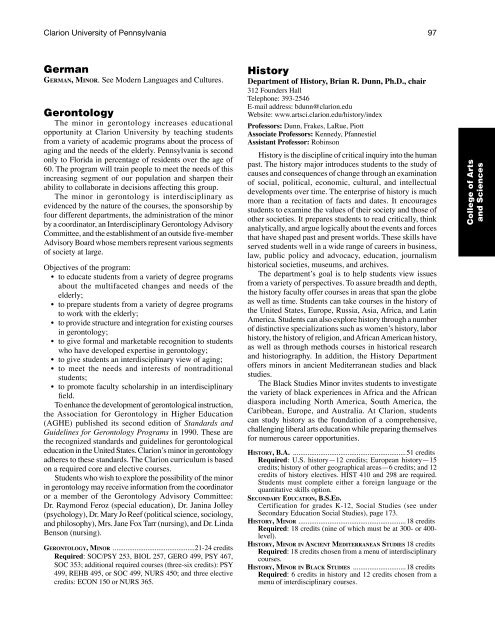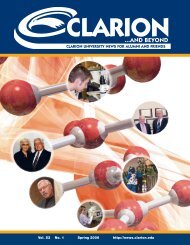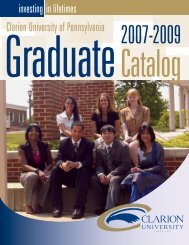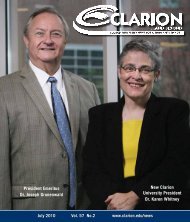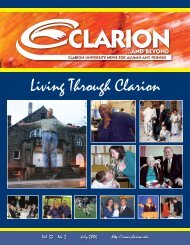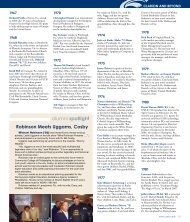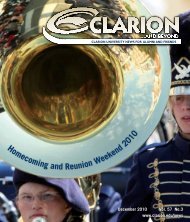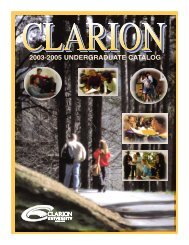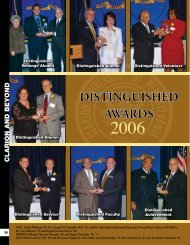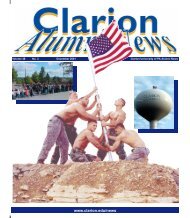Undergraduate - Clarion University
Undergraduate - Clarion University
Undergraduate - Clarion University
- No tags were found...
You also want an ePaper? Increase the reach of your titles
YUMPU automatically turns print PDFs into web optimized ePapers that Google loves.
<strong>Clarion</strong> <strong>University</strong> of Pennsylvania 97GermanGerman, Minor. See Modern Languages and Cultures.GerontologyThe minor in gerontology increases educationalopportunity at <strong>Clarion</strong> <strong>University</strong> by teaching studentsfrom a variety of academic programs about the process ofaging and the needs of the elderly. Pennsylvania is secondonly to Florida in percentage of residents over the age of60. The program will train people to meet the needs of thisincreasing segment of our population and sharpen theirability to collaborate in decisions affecting this group.The minor in gerontology is interdisciplinary asevidenced by the nature of the courses, the sponsorship byfour different departments, the administration of the minorby a coordinator, an Interdisciplinary Gerontology AdvisoryCommittee, and the establishment of an outside five-memberAdvisory Board whose members represent various segmentsof society at large.Objectives of the program:• to educate students from a variety of degree programsabout the multifaceted changes and needs of theelderly;• to prepare students from a variety of degree programsto work with the elderly;• to provide structure and integration for existing coursesin gerontology;• to give formal and marketable recognition to studentswho have developed expertise in gerontology;• to give students an interdisciplinary view of aging;• to meet the needs and interests of nontraditionalstudents;• to promote faculty scholarship in an interdisciplinaryfield.To enhance the development of gerontological instruction,the Association for Gerontology in Higher Education(AGHE) published its second edition of Standards andGuidelines for Gerontology Programs in 1990. These arethe recognized standards and guidelines for gerontologicaleducation in the United States. <strong>Clarion</strong>’s minor in gerontologyadheres to these standards. The <strong>Clarion</strong> curriculum is basedon a required core and elective courses.Students who wish to explore the possibility of the minorin gerontology may receive information from the coordinatoror a member of the Gerontology Advisory Committee:Dr. Raymond Feroz (special education), Dr. Janina Jolley(psychology), Dr. Mary Jo Reef (political science, sociology,and philosophy), Mrs. Jane Fox Tarr (nursing), and Dr. LindaBenson (nursing).Gerontology, Minor ..............................................21-24 creditsRequired: SOC/PSY 253, BIOL 257, GERO 499, PSY 467,SOC 353; additional required courses (three-six credits): PSY499, REHB 495, or SOC 499, NURS 450; and three electivecredits: ECON 150 or NURS 365.HistoryDepartment of History, Brian R. Dunn, Ph.D., chair312 Founders HallTelephone: 393-2546E-mail address: bdunn@clarion.eduWebsite: www.artsci.clarion.edu/history/indexProfessors: Dunn, Frakes, LaRue, PiottAssociate Professors: Kennedy, PfannestielAssistant Professor: RobinsonHistory is the discipline of critical inquiry into the humanpast. The history major introduces students to the study ofcauses and consequences of change through an examinationof social, political, economic, cultural, and intellectualdevelopments over time. The enterprise of history is muchmore than a recitation of facts and dates. It encouragesstudents to examine the values of their society and those ofother societies. It prepares students to read critically, thinkanalytically, and argue logically about the events and forcesthat have shaped past and present worlds. These skills haveserved students well in a wide range of careers in business,law, public policy and advocacy, education, journalismhistorical societies, museums, and archives.The department’s goal is to help students view issuesfrom a variety of perspectives. To assure breadth and depth,the history faculty offer courses in areas that span the globeas well as time. Students can take courses in the history ofthe United States, Europe, Russia, Asia, Africa, and LatinAmerica. Students can also explore history through a numberof distinctive specializations such as women’s history, laborhistory, the history of religion, and African American history,as well as through methods courses in historical researchand historiography. In addition, the History Departmentoffers minors in ancient Mediterranean studies and blackstudies.The Black Studies Minor invites students to investigatethe variety of black experiences in Africa and the Africandiaspora including North America, South America, theCaribbean, Europe, and Australia. At <strong>Clarion</strong>, studentscan study history as the foundation of a comprehensive,challenging liberal arts education while preparing themselvesfor numerous career opportunities.History, B.A. ...............................................................51 creditsRequired: U.S. history—12 credits; European history—15credits; history of other geographical areas—6 credits; and 12credits of history electives. HIST 410 and 298 are required.Students must complete either a foreign language or thequantitative skills option.Secondary Education, B.S.Ed.Certification for grades K-12, Social Studies (see underSecondary Education Social Studies), page 173.History, Minor ...........................................................18 creditsRequired: 18 credits (nine of which must be at 300- or 400-level).History, Minor in Ancient Mediterranean Studies 18 creditsRequired: 18 credits chosen from a menu of interdisciplinarycourses.History, Minor in Black Studies ..............................18 creditsRequired: 6 credits in history and 12 credits chosen from amenu of interdisciplinary courses.pages i-viiCollege of Artsand Sciences


